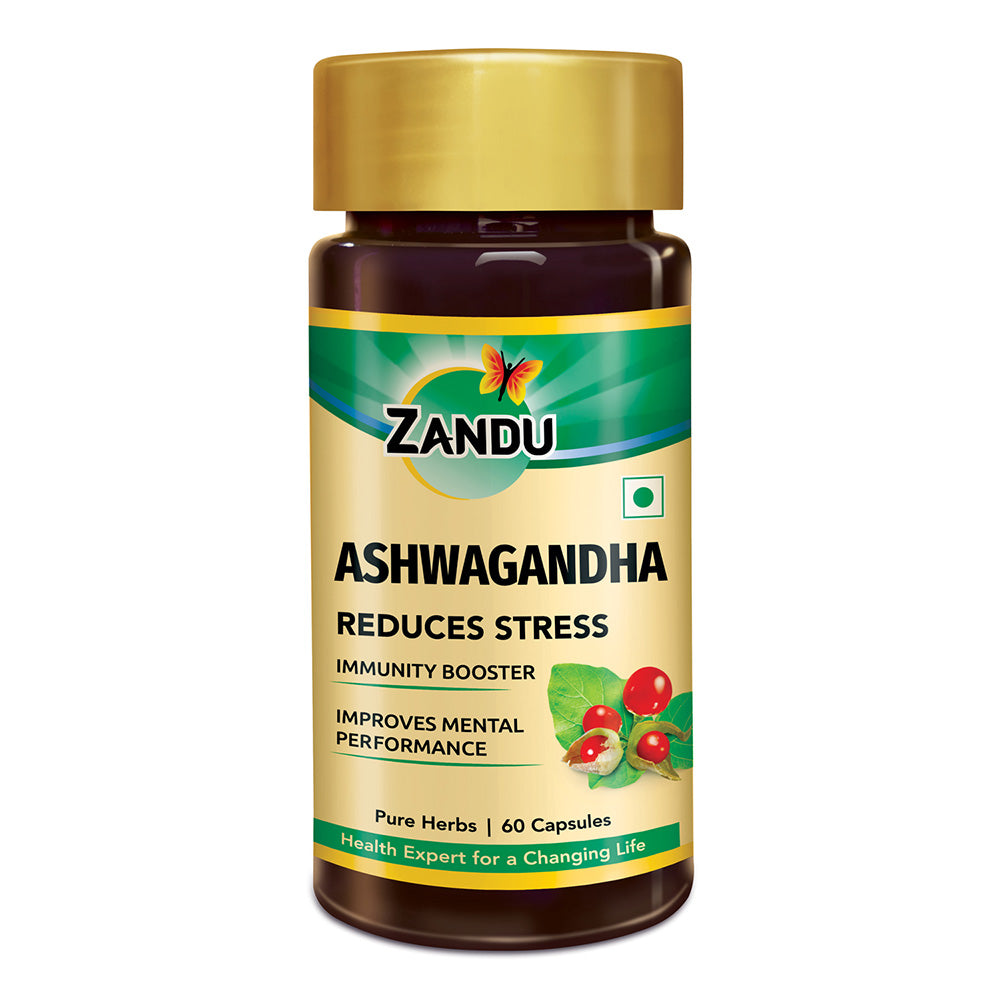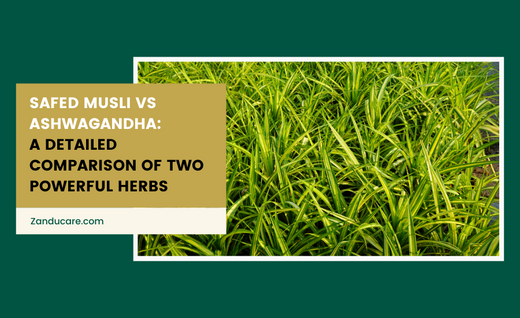
Reduces Stress & Cortisol, Improves Sleep and Muscle Recovery, with over 5% Withanolide Content | Scientifically Tested

Reduces Stress & Anxiety | 100% Natural Active | Root Extract | Improves Mental Performance | Scientifically Proven


AI Summary
Safed Musli and Ashwagandha are powerful Ayurvedic herbs known for enhancing overall health. Safed Musli boosts stamina, fertility, and muscle growth, while Ashwagandha reduces stress, improves mental clarity, and supports bone health. Both are safe when used properly and serve different wellness needs. Choosing between them depends on individual goals—vitality or stress relief. Consult an Ayurvedic expert before use.
Safed musli and ashwagandha are well-known herbs in the Ayurvedic world that have drawn much attention due to their health advantages. For ages, these age-old Indian herbs have been used to treat a wide range of illnesses and enhance general health.
Their appeal has grown even more recently as natural and alternative medicine methods have grown in favour. So which is superior, ashwagandha or safed musli?
We will examine these herbs in-depth and contrast them according to several criteria here.
|
Aspect |
Safed Musli |
Ashwagandha |
|
Botanical Name |
Chlorophytum borivilianum |
Withania somnifera |
|
Common Names |
Safed Musli, Indian Spider Plant |
Ashwagandha, Indian Ginseng, Winter Cherry |
|
Plant Family |
Asparagaceae |
Solanaceae |
|
Part Used |
Roots |
Roots, Leaves |
|
Primary Benefits |
Improves stamina, strength, and immunity |
Reduces stress, anxiety, and improves cognitive function |
|
Traditional Use |
Aphrodisiac, general tonic |
Adaptogen, a general tonic |
|
Active Compounds |
Saponins, Alkaloids |
Withanolides, Alkaloids |
|
Health Benefits |
Enhances sexual health, boosts energy levels |
Reduces cortisol levels, enhances mental clarity |
|
Usage in Ayurveda |
Treats male infertility, general debility |
Treats anxiety, fatigue, and insomnia |
|
Form |
Powder, capsules, tablets |
Powder, capsules, tablets, tea |
|
Side Effects |
Generally safe; mild gastrointestinal issues |
Generally safe; possible mild drowsiness or upset stomach |
|
Dosage |
3-6 grams per day (powder form) |
1-2 grams per day (powder form) |
|
Cultivation |
Grown in India, in subtropical climates |
Grown in India, the Middle East, and North Africa |
|
Harvesting Time |
After 2 years of growth |
After 1 year of growth |
|
Contraindications |
Not recommended for pregnant or lactating women without consulting a doctor |
Not recommended for pregnant women or those with hyperthyroidism without consulting a doctor |
|
Availability |
Widely available in health stores and online |
Widely available in health stores and online |
|
Popularity |
Increasing in popularity for athletic and general health benefits |
Widely popular for its adaptogenic properties and stress-relief benefits |
|
Did You Know-
|
Musli is a member of the Asparagaceae family and is known by the botanical name Chlorophytum Borivilianum. This tropical herb can be found all over the peninsular India's moist woodlands. The plant produces thick, white blooms with a Racemosus colour and lanceolate-shaped leaves. It often reaches 1.8 feet in height.

Ayurveda, being a holistic discipline, describes Musli as one of the key herbs utilised in Brihana Therapy, an Ayurveda treatment comprising various types of herbs that not only improve sex appeal, fertility, endurance and enhance strength. (2) When treating conditions like diabetes, osteoarthritis, weariness, muscle weakness, body-building, male weakness, etc., the Brihana therapy is quite helpful.
|
Nutritional Components |
Value (%) |
|
Alkaloids |
15-25 |
|
Total sugar |
66.3 |
|
Total proteins |
25.4 |
|
Glycosides |
1.9-3.5 |
|
Carbohydrates |
35-45 |
|
Crude fibre |
25-35 |
Due to its helpful ingredients, safed musli can be an excellent food for those who need to increase lean muscle mass yet are underweight, emaciated, or malnourished. In adults with exercise training, safed musli, which can also be taken as a nutritional supplement, may promote muscle growth by raising growth hormone levels.
Safed Musli's adaptogenic or anti-stress qualities make both formulations very helpful in treating many psychiatric issues, such as depression, dementia, etc. It helps to normalize the vata and pitta doshas in the body, which regulates the amount of serotonin hormone in the body and helps to lessen a number of anxiety-related symptoms, such as agitation, restlessness, chilly hands and feet, etc.
Safed musli has a potent hypoglycemic effect, which is critical for regulating the body's blood sugar levels. Additionally, it has antioxidants, which may help protect the pancreas from harm. This could help the insulin levels to rise. More research is required to further validate the benefits of Safed Musli on human blood sugar levels, as the data currently available is insufficient to support the benefits claimed.
Safed musli, renowned as a naturally growing herb that protects the heart, is very helpful in treating a variety of cardiac conditions. Its potent antioxidant properties help to fortify the heart muscles and inhibit the accumulation of lipids inside them, thus lowering the risk of heart attacks, heart blocks, blood clots, and other cardiac complications. Additionally, it is essential for reducing blood cholesterol levels.
Note: Now buy Safet Musli medicines at the best price online from our authentic website "zanducare.com".
An essential herb in the Ayurvedic medical system is ashwagandha. It is also referred to as winter cherry or Indian ginseng. The herb known by the name Ashwagandha gets its name from its unique scent, which is akin to horse sweat.
Because of its Vata-balancing and Rasayana (rejuvenating) qualities, ashwagandha is recognised as helping with stress and anxiety-related issues. These qualities may also benefit the management of diabetes. Additionally, it possesses the aphrodisiac virtue of Vajikarana, which helps alleviate erectile dysfunction and increase stamina.
Ashwagandha root powder can be given with milk to assist treat erectile dysfunction and male infertility. It treats several nerve-related issues as a nervine tonic. It offers assistance in the control of tension and anxiety. It balances how the body reacts to stressful situations.
The following quantities of nutrients in 100 grams of ashwagandha are: -
|
Energy |
245 Kcal |
|
Carbohydrate |
75 gm |
|
Dietary Fiber |
25 gm |
|
Protein |
3.9 gm |
|
Iron |
3.3 gm |
|
Calcium |
23 gm |
|
Vitamin C |
3.7 mg |
Also check our related comparison guides:
This potent combination is highly valuable for enhancing the body's overall vitality and stamina. The active components of ashwagandha and the other herbs in this blend increase the body's vigour and lessen weariness and weakness. Additionally, it enhances the adrenal glands' ability to operate, which lowers stress levels.
Anxiolytic (anxiety-relieving) activities of ashwagandha may be comparable to those of the drug lorazepam. An animal study suggests that lorazepam and ashwagandha may both help lower anxiety in animal models. Additionally, ashwagandha may have some antidepressant effects. This suggests that ashwagandha may be beneficial for anxiety and depression. Still, more investigation is needed. One should seek expert medical assistance for anxiety and depression since they may require significant care.
Mental stress has a negative impact on cardiovascular health and the circulatory system. The body's antioxidant defence mechanism is also impacted by stress. Ashwagandha may facilitate the body's adaptation to stress. It might also be useful for enhancing both physical and mental wellness. To verify these assertions, more investigation is necessary.
The onic has a great deal of advantages for strengthening bones and lowering joint discomfort and inflammation. It gives the body a robust and ideal skeletal structure, improves bone health, lowers the chance of fracture, and preserves overall body balance. In addition, it heals diseases including fibromyalgia, osteoporosis, and osteoarthritis and enhances bone and muscle mass.

Do check our, Ashwagandha Products:
Both safed musli and ashwagandha have their own unique set of benefits and uses. While safed musli is known for its aphrodisiac properties and benefits in hormonal balance, ashwagandha is famous for its adaptogenic and rejuvenating properties. It is not fair to say that one herb is better than the other, as they both have their own strengths. The choice between safed musli and ashwagandha ultimately depends on an individual's health needs and preferences. So, consult a Zanducare Ayurvedic healthcare professional before adding these herbs to your routine and enjoy their numerous health benefits!
Also, read:
Safed Musli boosts stamina and sexual health, while Ashwagandha reduces stress and improves mental clarity. Choose based on your specific needs: energy and vitality or stress relief and cognitive function.
It is believed to enhance hormone growth production, which can aid in promoting weight gain and muscle building in a healthy way. Safed musli is also well-known for having adaptogenic qualities, which indicates that it can lessen tension and anxiety by assisting the body in managing these emotions.
Yes, you can take them both at once, but it's advisable to speak with an Ayurvedic doctor to make sure the dosage and suitability are right for you.
Ashwagandha is more commonly used as an adaptogen to treat anxiety and stress because of its ability to reduce stress.
Before taking Safed Musli or Ashwagandha, pregnant women should speak with their ayurvedic doctor because in some cases, these supplements may not be advised.
Ashwagandha and Safed Musli can be taken as tablets, capsules, or powders. You can also drink ashwagandha tea.
Yes, you can take Safed Musli before sleep. It is generally safe and may help improve stamina and overall health, but consult a doctor for personalised advice.
Safed Musli is more beneficial for enhancing stamina and physical strength.
Safed Musli is generally safe but may cause mild gastrointestinal issues in some people.
Ashwagandha is an herb used to reduce stress and anxiety, improve cognitive function, and act as a general tonic. It is known as an adaptogen.
References

Reduces Stress & Cortisol, Improves Sleep and Muscle Recovery, with over 5% Withanolide Content | Scientifically Tested

Reduces Stress & Anxiety | 100% Natural Active | Root Extract | Improves Mental Performance | Scientifically Proven
Leave a comment
This site is protected by hCaptcha and the hCaptcha Privacy Policy and Terms of Service apply.